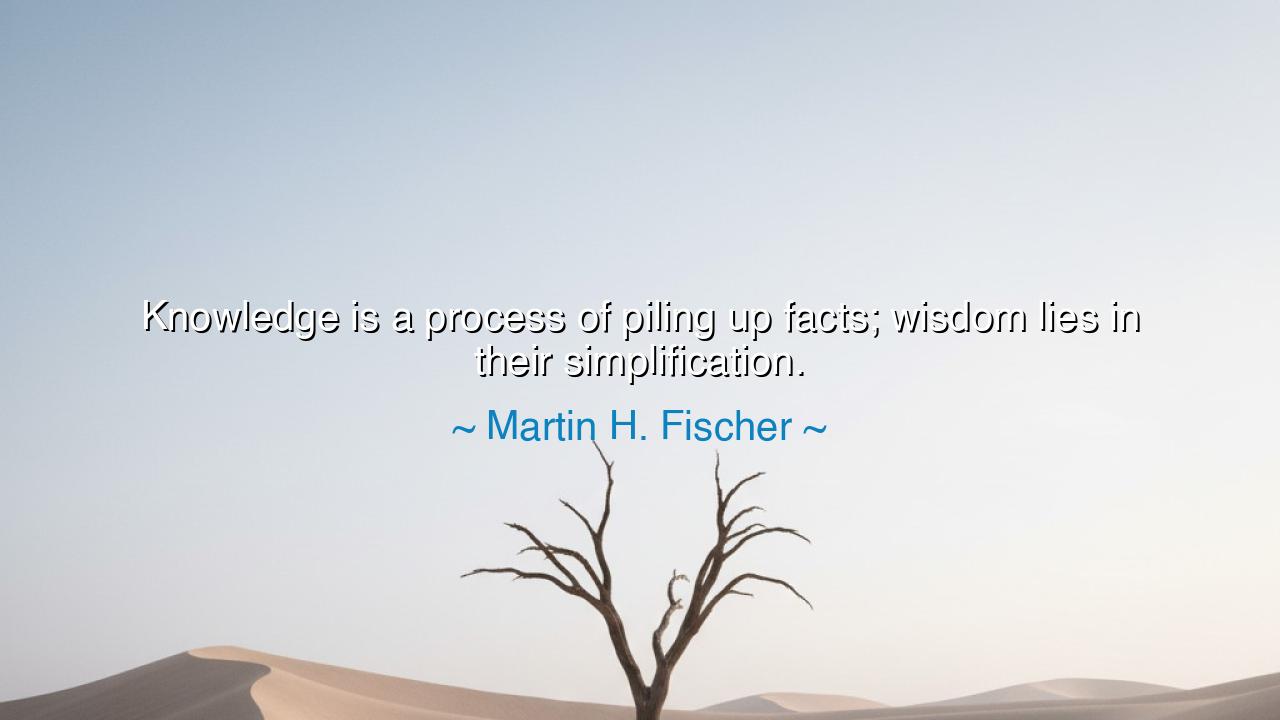
Knowledge is a process of piling up facts; wisdom lies in their






“Knowledge is a process of piling up facts; wisdom lies in their simplification.” — Martin H. Fischer
In this luminous reflection, Martin H. Fischer, the great physician and philosopher, captures the eternal struggle between the mind that collects and the soul that understands. His words are a torch for all who seek truth, reminding us that knowledge and wisdom are not the same. Knowledge gathers — it piles up, layer upon layer, an endless mountain of facts. But wisdom distills — it cuts through the multitude to find the essence, the simple pattern beneath the complex web. For in the end, truth is never a heap of things, but a harmony of meaning. The wise do not drown in details; they see the ocean in a drop.
The origin of this thought arises from Fischer’s life as both a scientist and a teacher. In his laboratories and lecture halls, he saw students and scholars chase after knowledge endlessly, collecting facts like pebbles on a shore, yet failing to see the vast sea that lay before them. He understood that the purpose of learning is not to amass, but to illuminate — to turn knowledge into clarity, into something that serves life. His words are thus not a rejection of knowledge, but a reminder that its true destiny is simplicity — that which reveals the whole through the few, the eternal through the immediate.
To understand this, one must know the rhythm of learning. In the beginning, the student gathers: he memorizes, compares, dissects. Every new fact feels like a victory, every new concept a treasure. But the path of the seeker does not end in accumulation. For if he stops there, he becomes a prisoner of detail — his mind heavy with fragments, unable to move freely. True wisdom begins only when he can see how all things connect, when he no longer clings to each fact, but perceives the order that gives them life. Then, the pile of knowledge becomes a single flame — clear, steady, and illuminating.
Consider the example of Albert Einstein, who, though a master of mathematics and physics, sought always the simplicity behind complexity. When others filled blackboards with equations, Einstein asked, “What is the nature of light? What is the essence of space and time?” Through that childlike simplicity of question — not the piling up of data but the stripping away of illusions — he changed humanity’s understanding of the universe. His wisdom lay not in how much he knew, but in how purely he saw. As he himself once said, “Everything should be made as simple as possible, but not simpler.” That is the very heartbeat of Fischer’s truth.
There is also a moral dimension to these words. In our age, men are surrounded by knowledge as never before. Information floods their eyes and ears; yet wisdom retreats. The more facts they collect, the less they seem to understand. We live in a time where many know how, but few know why. The wise man, however, does not mistake quantity for depth. He pauses, reflects, and asks, “What matters most?” He knows that simplicity is not ignorance but insight — the refinement of the mind, the purification of thought. To simplify is to see clearly, to strip away the noise until only truth remains.
This principle applies to all realms of life — science, art, leadership, and love. The painter may study every technique, every theory of color, but true art is born when he paints from the heart’s simplicity. The leader may read countless strategies, but true guidance comes from seeing clearly what is right and necessary. Even in the realm of the soul, the same law reigns: faith, love, and peace are not complex; they are pure, direct, and simple. The more we know, the more we must learn to return to that simplicity — the still point where wisdom dwells.
Therefore, dear seeker, take this lesson as both challenge and comfort: do not mistake the accumulation of knowledge for the attainment of wisdom. Study deeply, but also learn to let go. Gather your facts, but do not worship them. Ask yourself, always, “What is the heart of the matter?” For the world does not need minds that merely remember — it needs hearts that understand. The wise are not those who know everything, but those who know what is essential.
And so, remember Fischer’s immortal counsel: “Knowledge is a process of piling up facts; wisdom lies in their simplification.” Learn much, but live simply. Seek broadly, but see deeply. Let your knowledge serve your wisdom, not the other way around. For the goal of learning is not to weigh the mind down, but to set it free — to look upon the countless details of life and say, with calm and certainty, “Behold, it is one.”






AAdministratorAdministrator
Welcome, honored guests. Please leave a comment, we will respond soon